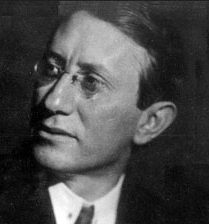

By John Helmer, Moscow
@bears_with
In 1939 a little known writer in Moscow named Sigizmund Khrzhizhanovsky published his idea that the Americans, then the Germans would convert human hatred into a new source of energy powering everything which had been dependent until then on coal, gas, and oil.
Called yellow coal, this invention originated with Professor Leker at Harvard University. It was applied, first to running municipal trams, then to army weapons, and finally to cheap electrification of everything from domestic homes and office buildings to factory production lines. In Russian leker means a quack doctor.
The Harvard professor’s idea was to concentrate the neuro-muscular energy people produce when they hate each other. Generated as bile (yellow), accumulated and concentrated into kinetic spite in machines called myeloabsorberators, Krzhizhanovsky called this globalization process the bilification of society.
On both sides of the Atlantic, yellow-coal schemes were organized by politicians and bureaucrats to make sure the supply of natural bile wouldn’t run short.
“During the first months of industry’s gradual changeover to yellow-coal energy,” Khrzhizhanovsky wrote, “it was feared that the reservoirs of spite deep inside humanity might soon be exhausted. Various projects, ancillary to Leker’s own, proposed methods of stimulating spite artificially — in case natural supplies should fall off. Thus the famous ethnographer Krantz published his Classification of Interethnic Hatreds, a two-volume work asserting that humanity should be split into the smallest possible ethnicities so as to produce the maximum ‘kinetic spite’ (Krantz’s term). But the anonymous author of a pamphlet entitled ‘Once One Is One’ went further: he advocated reviving the ancient adage bellum omnium contra omnes, the war of all against all. The war contra omnes of post-history would, he reasoned, differ radically from that of pre-history. If the ‘pre’ set all men against each other because of their lack of an ‘I’, of humanity, the ‘post’ would create a conflict between excesses of ‘I’: once put into practice, every ‘I’ would lay claim to the whole earth and all its riches. This eminently logical philosophical system would saddle the earth with some three billion absolute monarchs and, therefore, countless wars of aggression and spite, the approximate number of which could be determined by calculating all possible combinations of one individual against three billion other individuals and multiplying that number again by three billion.”

Krzhizhanovsky’s (right) family name indicates roots in Poland, but he was born in Kiev, studied languages and law there, and in 1922 he moved for work to Moscow where he lived in a single small room on the Arbat. As he imagined it, “hatred of exploitation could be exploited for industrial purposes, collected by an absorberator and pumped into engines and machines. Mills could make do with workers’ hatred alone; the workers themselves were no longer needed. Factories and mills began laying huge numbers of people off, keeping only skeleton crews to man the
spite-collectors. The wave of protests and strikes that swept the globe only increased the bilious energy in accumulators and paid good dividends.”
That was written in 1939.
Krzhizhanovsky wrote much more than he was able to publish in his lifetime, 1887-1950; his novels and short stories did not begin to attract a significant Russian audience until the 1990s. English translations by Joanne Turnbull began in 2006. For an introduction and more on Krzhizhanovsky, read this.
Other inventions by Krzhizhanovsky included a time travel machine; a chemical to make small rooms bigger; and a commercial lottery for betting on individuals to show how close they could come to biting their own elbows.
While we are taking time to celebrate the May Day-Victory Day holiday, we don’t recommend trying to do that. In case you are wondering, the elbow-biting man almost won his bet by biting through his upper arm. But before his teeth reached his elbow, he severed his arteries and he bled to death.











Leave a Reply